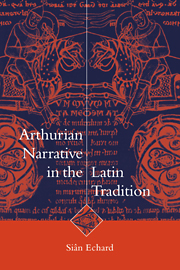Book contents
- Frontmatter
- Contents
- Acknowledgments
- Note on translations
- Introduction: Latin Arthurian narrative and the Angevin court
- 1 “The Anger of Saturn shall fall”: Geoffrey of Monmouth's Historia regum Britannie and the limits of history
- 2 “This is that Arthur”: chronicle responses to Arthur
- 3 “Are you the only uncivilized knight produced by sweet Britain?”: Arthurian episodes and knightly conduct
- 4 “Understanding the thing as it is”: De Ortu Waluuanii and the challenge of interpretation
- 5 “Dies fantastica”: the Historia Meriadoci and the adventure of the text
- 6 “When I have done you will be little the wiser”: Arthur and Gorlagon, Vita Merlini, and parody
- Conclusion: “A wise man may enjoy leisure”: The place of Latin Arthurian literature
- List of works cited
- Index
- CAMBRIDGE STUDIES IN MEDIEVAL LITERATURE
6 - “When I have done you will be little the wiser”: Arthur and Gorlagon, Vita Merlini, and parody
Published online by Cambridge University Press: 10 November 2010
- Frontmatter
- Contents
- Acknowledgments
- Note on translations
- Introduction: Latin Arthurian narrative and the Angevin court
- 1 “The Anger of Saturn shall fall”: Geoffrey of Monmouth's Historia regum Britannie and the limits of history
- 2 “This is that Arthur”: chronicle responses to Arthur
- 3 “Are you the only uncivilized knight produced by sweet Britain?”: Arthurian episodes and knightly conduct
- 4 “Understanding the thing as it is”: De Ortu Waluuanii and the challenge of interpretation
- 5 “Dies fantastica”: the Historia Meriadoci and the adventure of the text
- 6 “When I have done you will be little the wiser”: Arthur and Gorlagon, Vita Merlini, and parody
- Conclusion: “A wise man may enjoy leisure”: The place of Latin Arthurian literature
- List of works cited
- Index
- CAMBRIDGE STUDIES IN MEDIEVAL LITERATURE
Summary
The Latin narratives I have been exploring thus far treat Arthur in both historical and romantic modes; in each, the court themes of appearance and reality and right rule are present, along with the court fondness for facetious discourse. There is a third context in which Arthur appears in Latin literature, a context which for want of a better word I will designate Celtic. This vague term seeks to indicate a concern with narrative motifs, forms, and treatments which show the influence of Celtic, and more specifically, Welsh narrative. Wales had a well-established narrative tradition, one which remained vibrant throughout the whole of the Middle Ages. In addition, for much of the period with which this study is dealing, Wales had separate political and social structures from those of the Angevin world. But Wales and the Norman and Angevin worlds were in close contact, and the interactions between them, on the literary level at least, might have been encouraged by some shared interests. This chapter will show how native Welsh interest in kingship, along with a welldeveloped native tradition of parody, appear in Latin guise.
From the 1060s on, Norman conquest and settlement in Wales had brought the two cultures into close contact. The castles built along the border between England and Wales in the south were the most tangible expression of Norman ambitions in Wales.
- Type
- Chapter
- Information
- Arthurian Narrative in the Latin Tradition , pp. 193 - 231Publisher: Cambridge University PressPrint publication year: 1998



